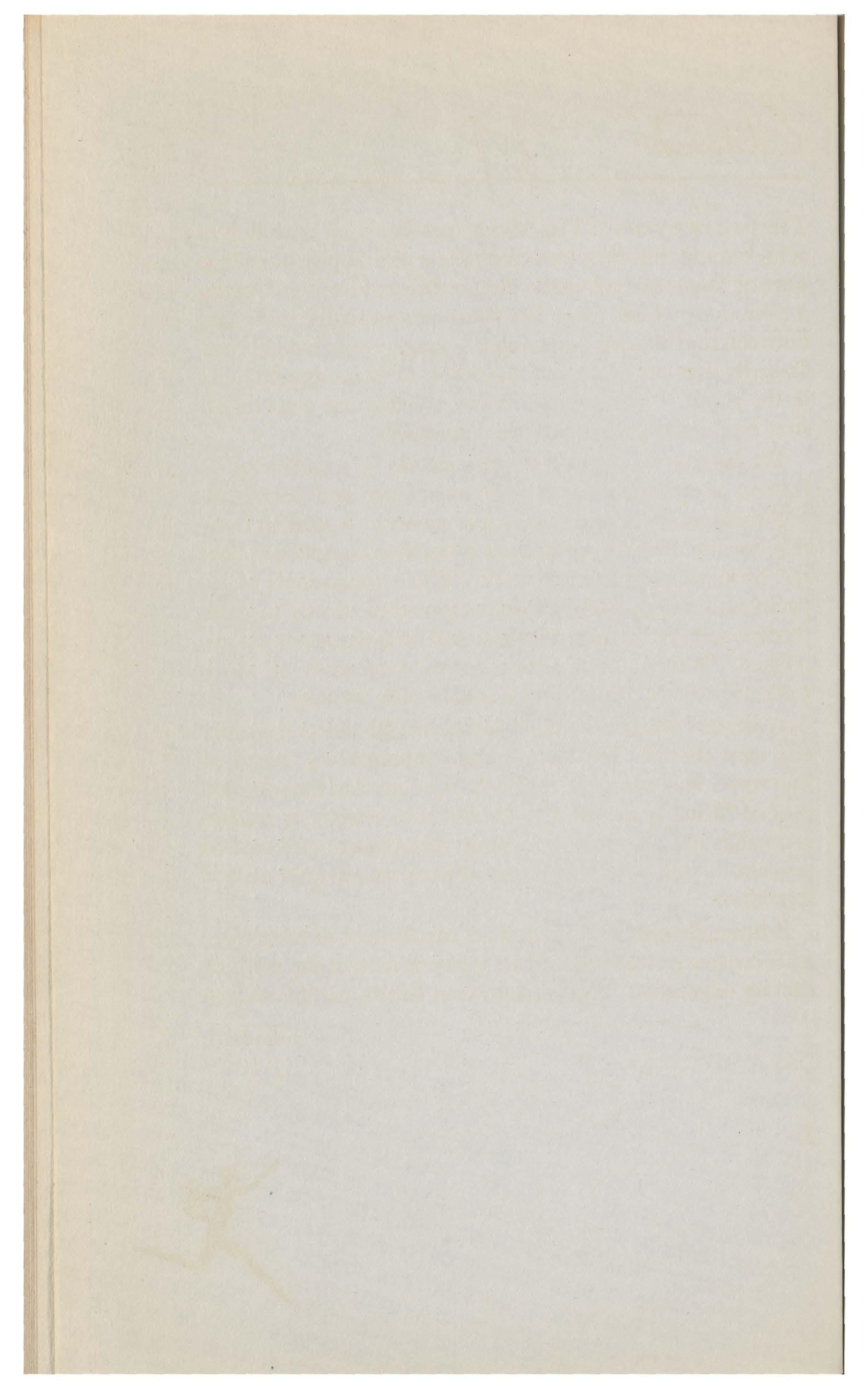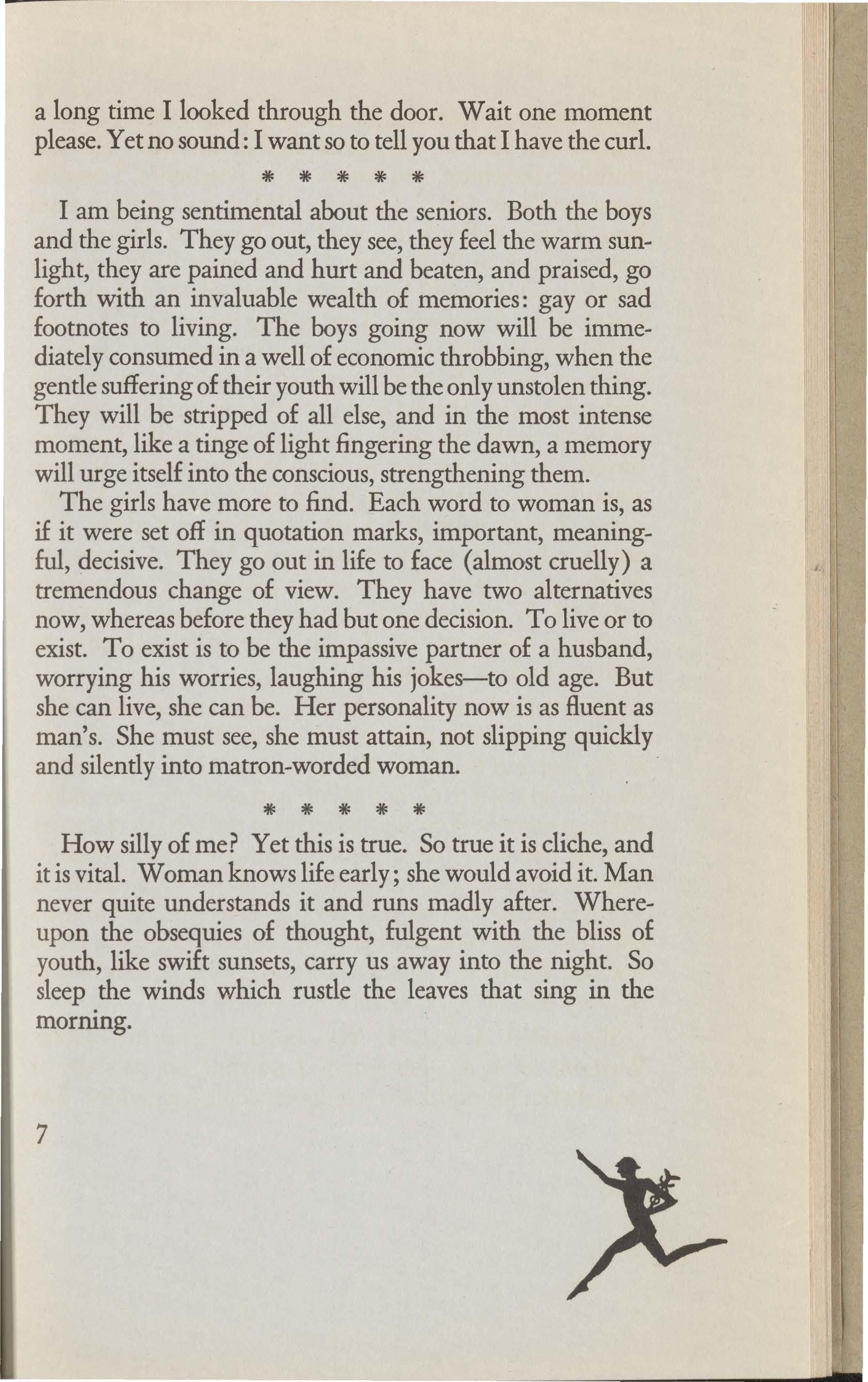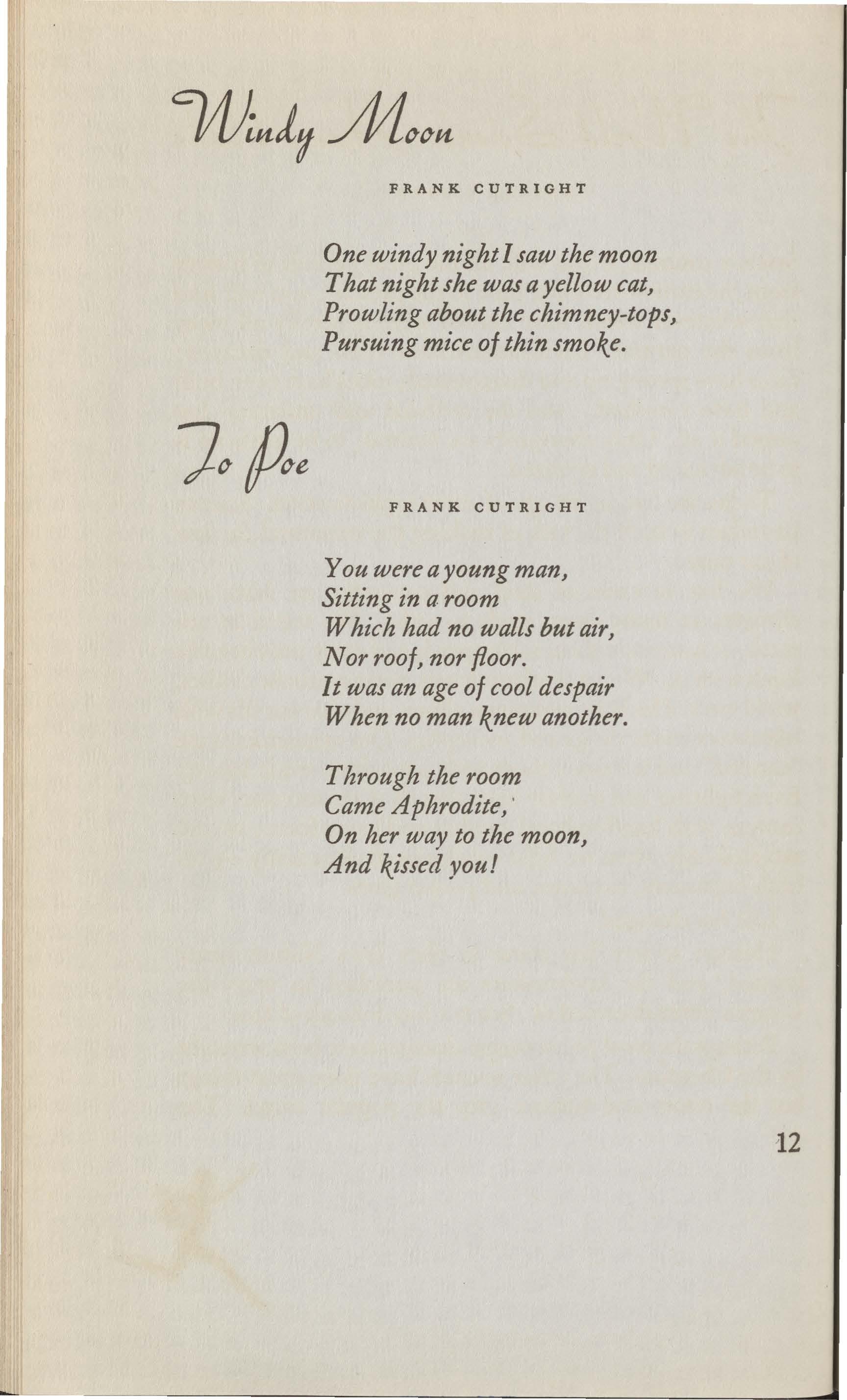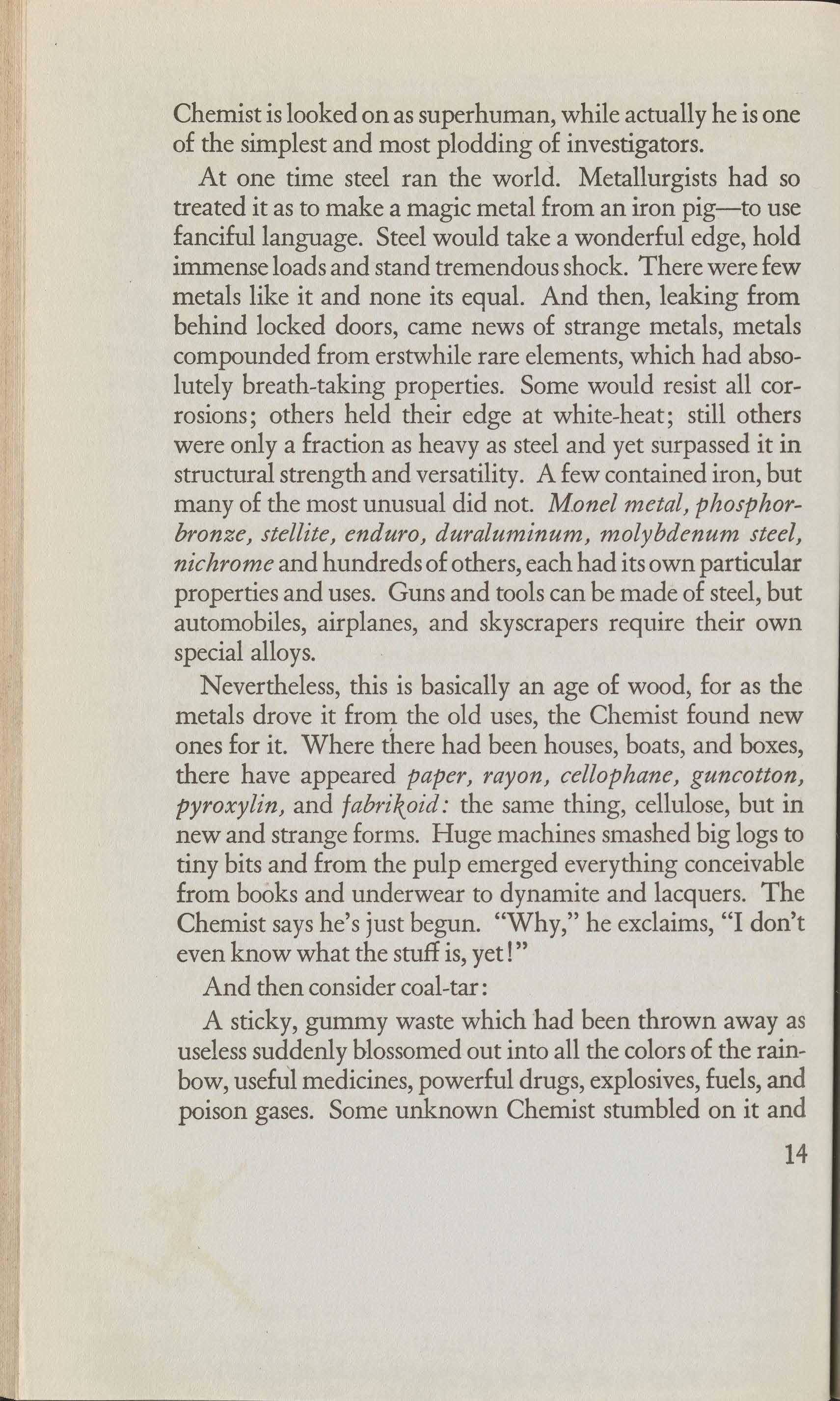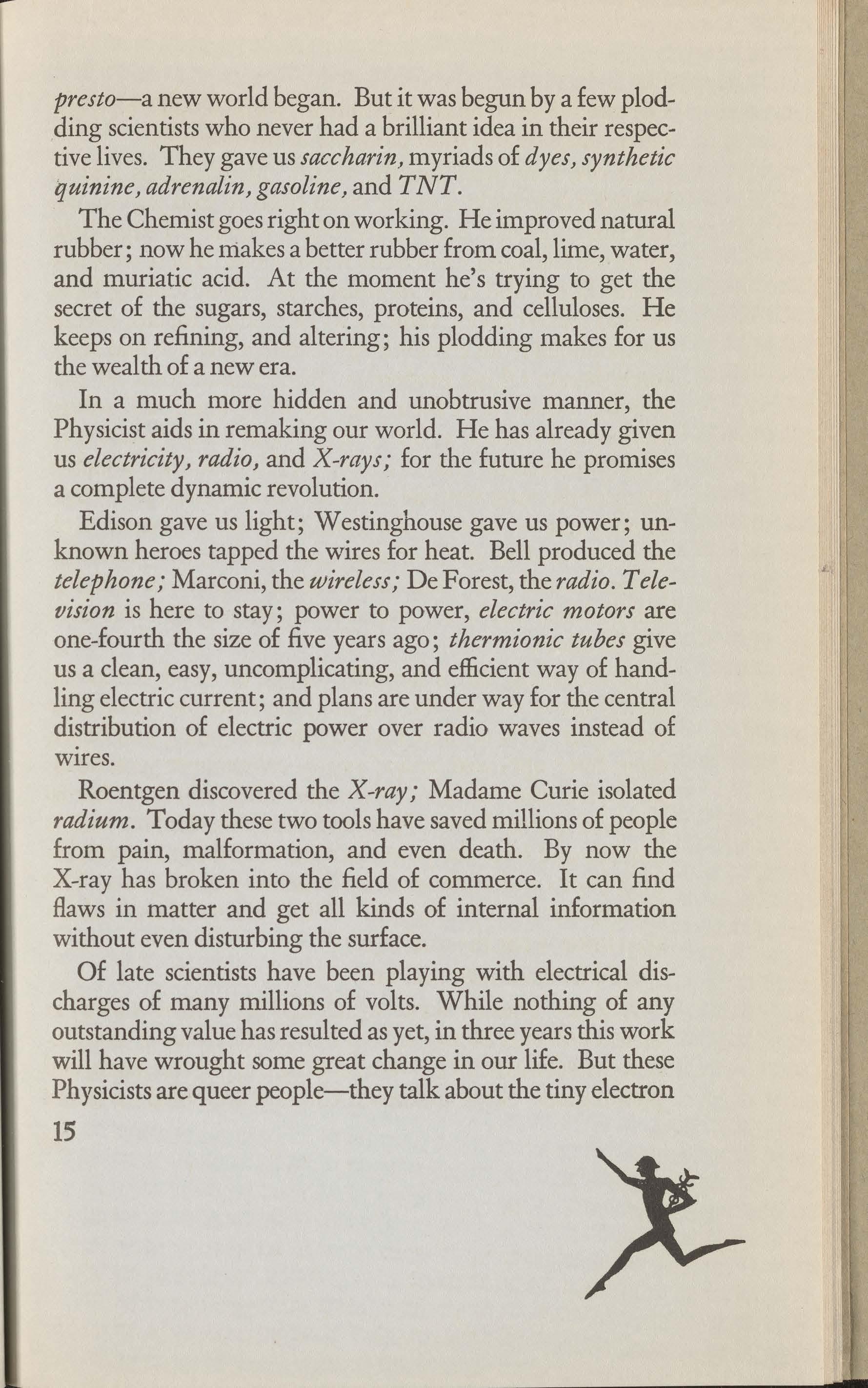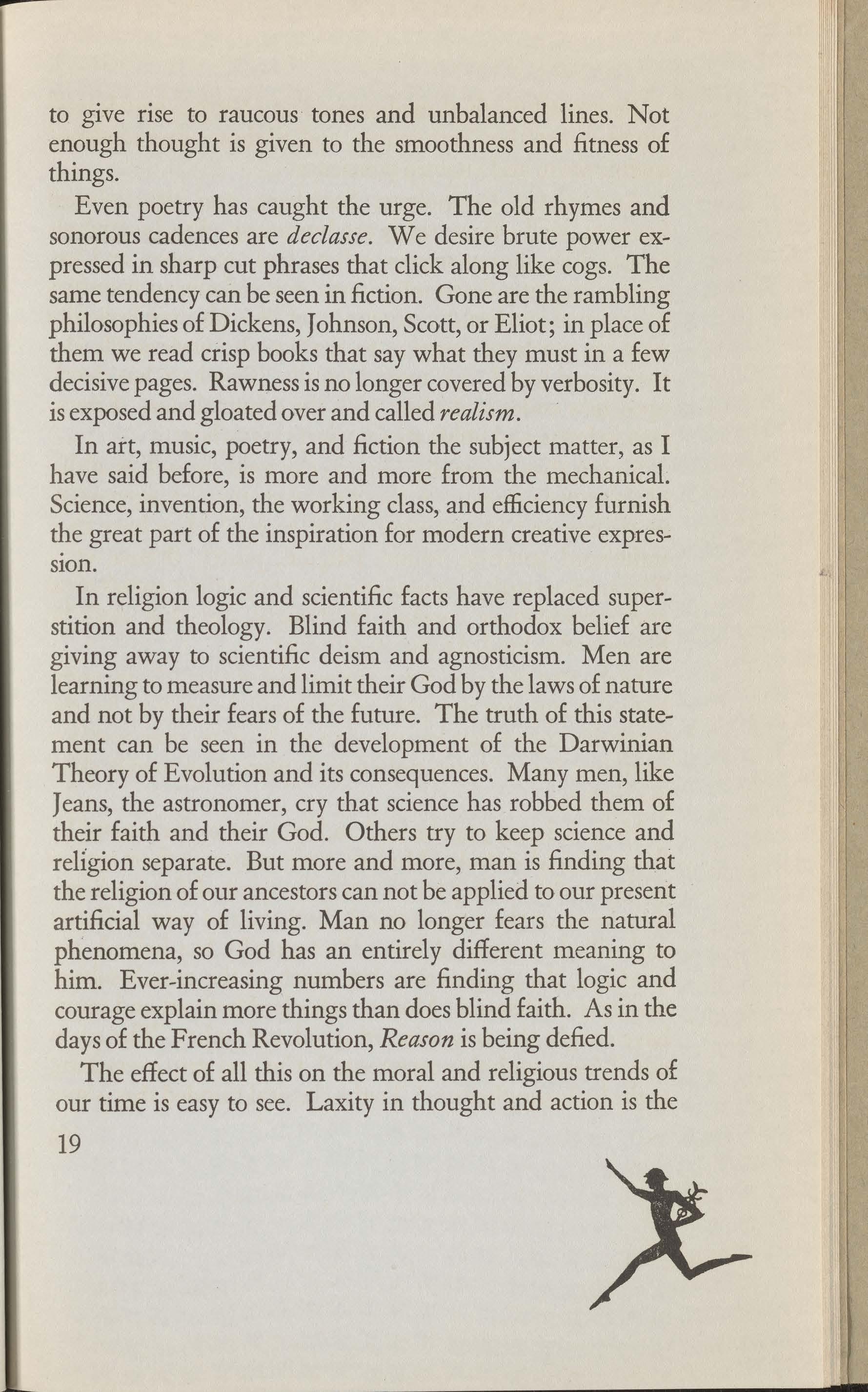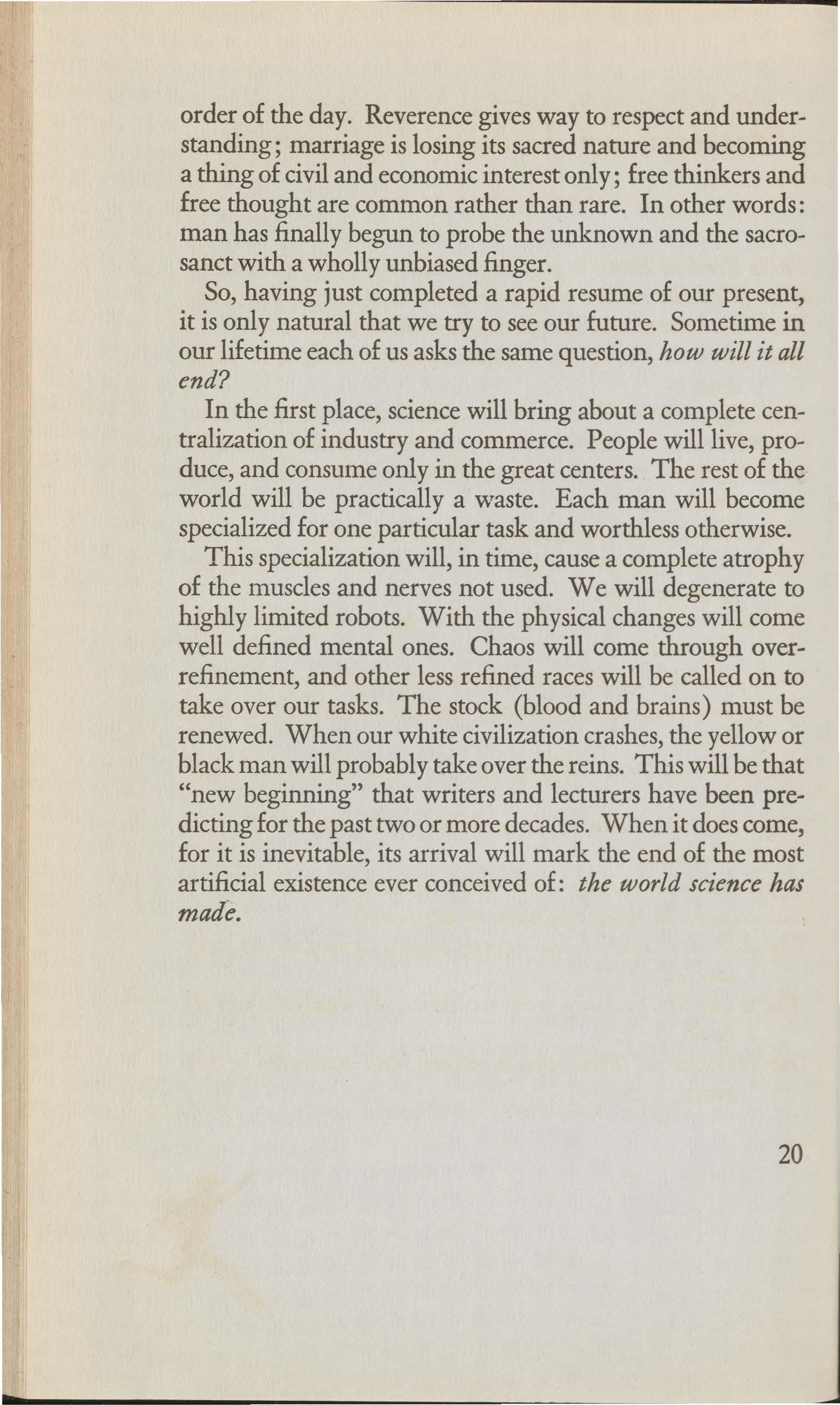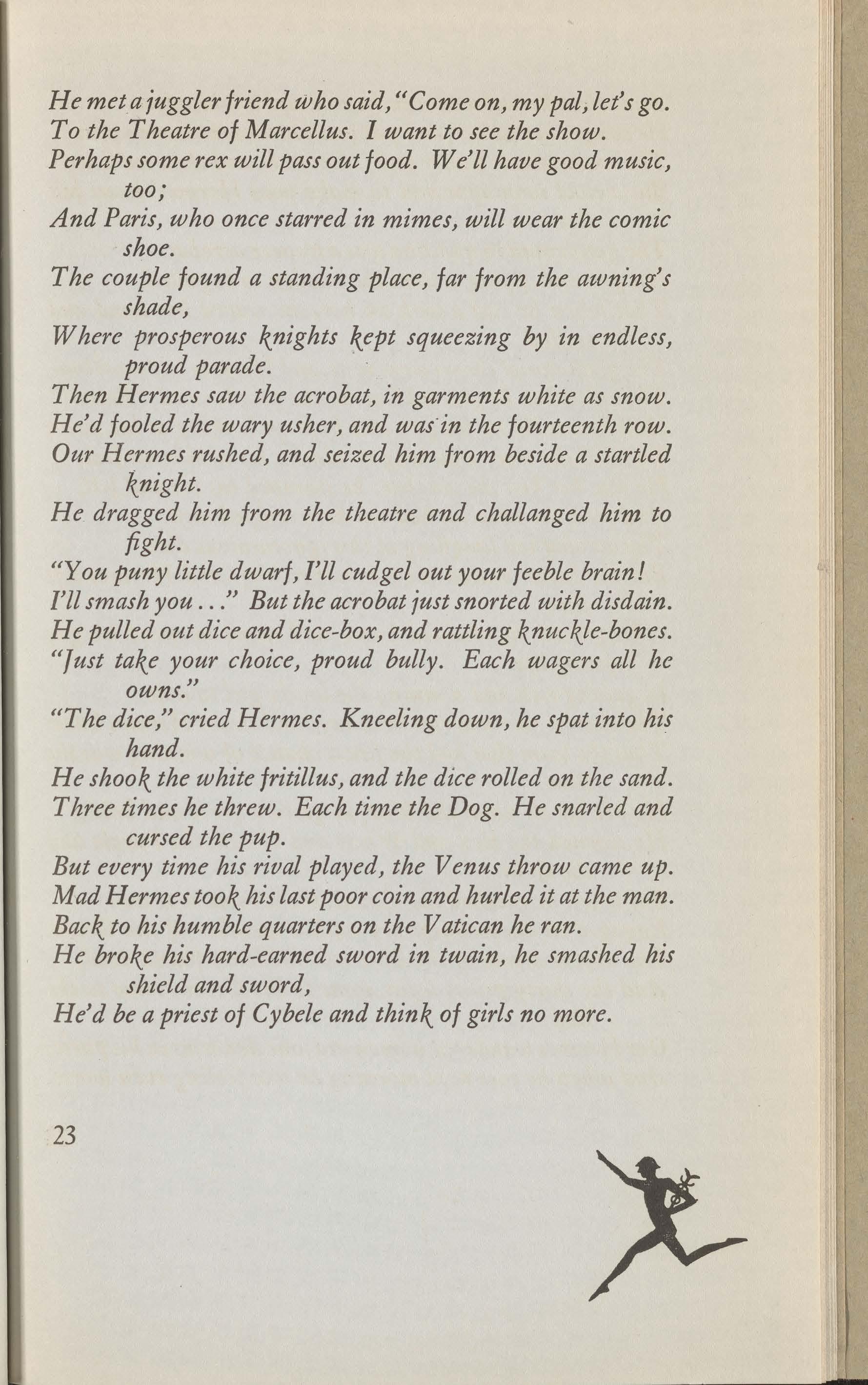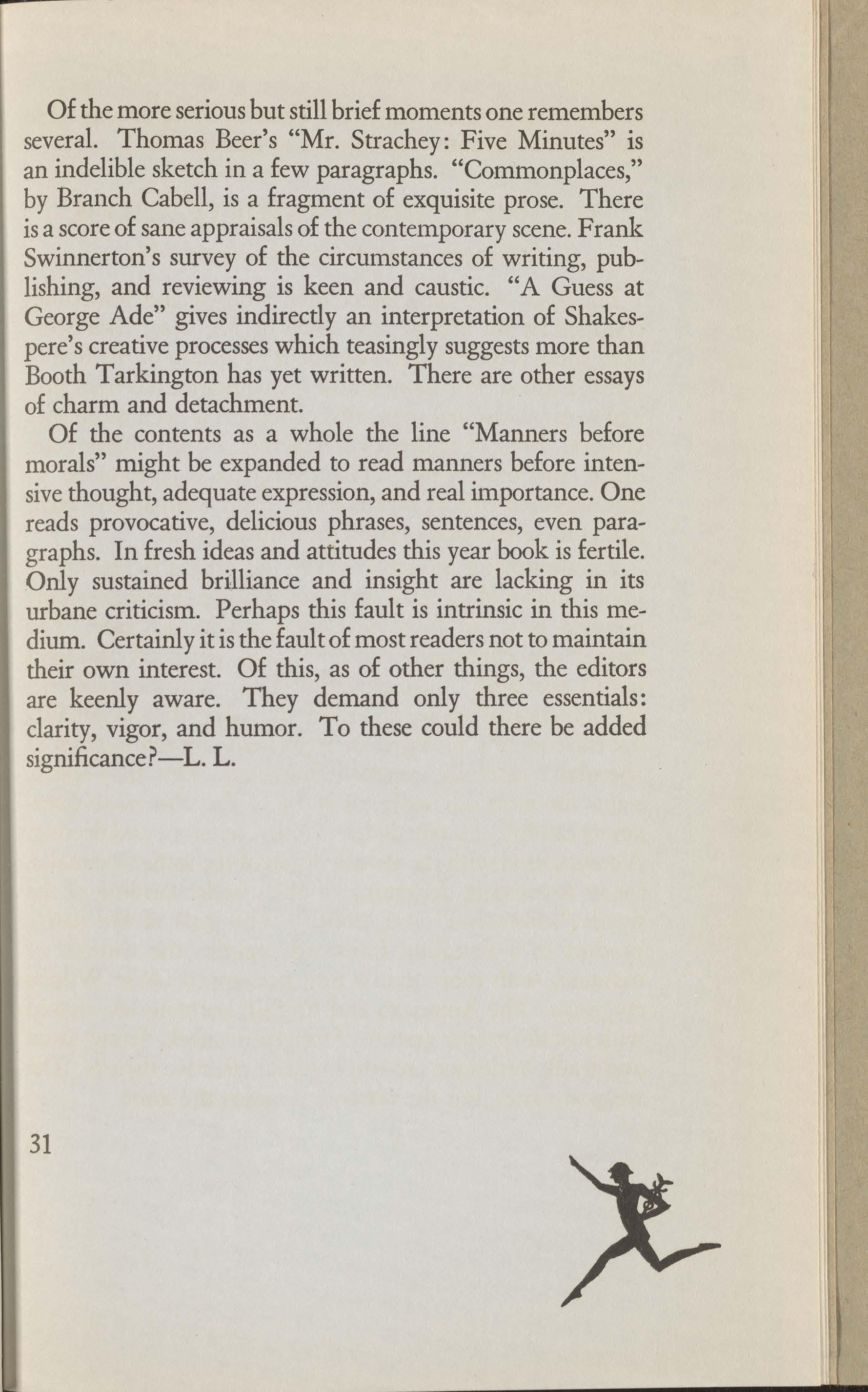Lou1sE LEATIIERLAND, Editor-in-Chief; FLORENCE RHEA TALLEY and MARY PATTERSON EARLY, Associate Editors; MARY HARRINGTON, Business Manager.
SPRING NUMBER
THE past two years of THE MESSENGER have not been rich in achievement, but they have brought a philosophy of college writing that is not yet totally divorced from idealism. During a period in which there has been an unusually wide gap between the best and the possible a certain credo has evolved. In order that our successorsmay not look upon this declivity as the result of want of awareness and that our own minds may be clarified, we review this philosophy.
We believe that college writing should be somehow a reflection of campus thought, with experience and transforming imagination at once the proper sources. A student body that does not think from other motives than compulsion does not produce good literary work. When individuals of capacity and energy find themselves spread too thinly in every student activity, writing of power and urbanity is not accomplished. Writing is a self-conscious expression of ideas. Forgetfulness of this axiom means slovenly writing.
A literary magazine, we believe, should reflect not only our own thought but that of the contemporary world of · literature. Reviews of recent books have not had the sole purpose of filling space but also the desire to suggest to readers accessible and provocative writing. Confining one's mental processes to the bounds of required work means later mental stagnation.
Editing should be at its best an enrichment of literature, an incentive to creation. At its worsf"it freezes the wells of literary expression. And so, into your hands, gentle readers.
-L.L.
A goblet filled with moonlight cool
As hands superbly tender, strong . . .
The silver laughter of spring rains .. .
The quivering ecstasy of song .. .
A slim vial filled with perfume rare
As nectar meant for/ ove's delight ..
The music of high pines at dusk
The goddess-grace of virgin night ...
I thought these dreams were dead . .. today
Was spring once more; tonight they rise
To pierce my heart with cherished hopes
That I can never realize.
When I let myself dream now again
A pain-so beautiful it blindsPervades my being; all my soul
Expands with the bitter joy it finds ...
DOROTHY HARRISON
HAROLD A. LOVENSTEIN
MosT of our lives are spent summoning up the past: events, more or less happy, completed or left in the agony of the unfinished. These memories, when they return to us, are teasing footnotes to our present lives-winnowing one past moment from an endless chain of hours.
I remember, above all the footnotes fastening themselves to my life, one perhaps more urgent than the rest-beckoning with keener venom the decayed eloquence of a happy childhood. I was lunching in Greenwich Village last summer, at the Pelleas, all too short lived- ·watching literary phantoms, anemic in their unfed ambitions, moving about, silenced screams of immortality, when my impersonal feeling of inspection was shattered by the word: Harold. I looked up, bewildered, believing some devil to have identified me mockingly with these puppets. I looked into the face of an all too lovely girl. There were no words for her. There was only silence glutting the air. "You don't recognize me, do you?" Did I not? I wonder. I mumbled something and · she sat down at the table. She said I had changed. Yes, and you, faun! Footnote! Footnote-a chapter referred. Dead and cold these bodies in the afternoon . . . she recalled the past. We were at grammar school together. How could I have forgotten? Had I? I wonder. She laughed; the little faun; a dull laugh, mingling a desperate moment in puppet's laughter. You cut off one of my curls in school. It would be just like you to have kept it.
The past, lazy sprite in wings, electrified my brain with mementoes of a dead life. Remember! Remember l Love, do I remember. How stupid my gentle poetry now and 5

sickly words permeating the mood. I want to tell you ... I want to tell you . . . but sound died in the will. She was working, sketching, you know. You remember, I used to draw in school. Do I? I wonder. What am I doing? I am here. I came to finish my novel and forget an unhappy experience back in Richmond. I was hurt in Richmond. A young person whom I love has hurt me. She tasted me as if I were wine. I was wine. I am telling this to you. You are an old friend. You, whose loveliness you ask have I remembered, are an old friend. I am tired. I have sought a violet under the snow. She did not bury it for me, but I have sought the violet under the snow. I am sick and tired. To be betrayed is aging. Are you in love. Are you happy. What is your life now. I see a line in your face. You are old. You are a hag. You are wretched. I hate you. You remind me. You are the other side of my unhappiness. I must plunge in its depth to reach you. You would be pleasant. You would be beautiful. Were I a dream? but what am I doing? I am here. I came to finish my novel and to forget an unhappy experience back in Richmond.
All of this is lovely now: the Pelleas, the cognac and coffee, this sweet Proustian pain. It is precious. I have seen the sun in the east and the west. The same sun? No, unbelievable though I know it to be, it is as different as an old man and an old man's youth. You are a moment at the bottom of a page. I would have overlooked you even though you are valuable. You are talking. Go on talking. I will learn you again. I will memorize your words. I will touch your hand when I take your card. You must go? Of course, I knew you could not stay. But then-but then there is ... what is there to help us grasp, just once, the beautiful.
She smiled. Her card. Yes. But I'll never call. Gone. Wait one moment. No sound. I watched her go away. I looked after her and I saw a million people pass a door. For 6
a long time I looked through the door. Wait one moment please. Yet no sound: I want so to tell you that I have the curl.
* * * * *
I am being sentimental about the seniors. Both the boys and the girls. They go out, they see, they feel the warm sunlight, they are pained and hurt and beaten, and praised, go forth with an invaluable wealth of memories: gay or sad footnotes to living. The boys going now will be immediately consumed in a well of economic throbbing, when the gentle suffering of their youth will be the only unstolen thing. They will be stripped of all else, and in the most intense moment, like a tinge of light fingering the dawn, a memory will urge itself into the conscious, strengthening them.
The girls have more to find. Each word to woman is, as if it were set off in quotation marks, important, meaningful, decisive. They go out in life to face (almost cruelly) a tremendous change of view. They have two alternatives now, whereas before they had but one decision. To live or to exist. To exist is to be the impassive partner of a husband, worrying his worries, laughing his jokes-to old age. But she can live, she can be. Her personality now is as fluent as man's. She must see, she must attain, not slipping quickly and silently into matron-worded woman.
* * * * *
How silly of me? Yet this is true. So true it is cliche, and it is vital. Woman knows life early; she would avoid it. Man never quite understands it and runs madly after. Whereupon the obsequies of thought, fulgent with the bliss of youth, like swift sunsets, carry us away into the night. So sleep the winds which rustle the leaves that sing in the morrung.
HALDER FISHER
Up crept the mist from lowlands dank. From where the sunbeams kissed,
A while ago, the river's bank Up crept the mist.
How came it here? Did it enlist The gods to play this prankOr came it here to keep a tryst?
The landscape now was one pale blank Shaped by this alchemist. But still, along the hill's sharp fiank, Up crept the mist.
c:£no-w-c:£care
HALDER FISHER
These scenes, I think, of black And white on white and black, A God turned Dierer to en grave For us.
HALDER FISHER
NegroesGiants with eyes
Which shine for stars at nightHave dumped that snowy cotton there For clouds.
HALDER FISHER
Just look Along this beach: See, Neptune's wild horses Come snorting, trampling, roaring home To feed.
MARTHA ELISABETH RIIS
Life laughs in the wind. Leaves whirl and dance, Loving each mad moment. Trees bow and curtsey A grace/ ul minuet. Blinds creak with eagerness To be off to the ball. Gutter trash leaps and screams, Tattered by strange desires. "Away! Fly! Adventure abounds." Is the cry of all. Man alone bucks the wind. He knows the calm beyond.
MARTHA ELISABETH RIIS
Whence comes this fierce passion, A blinding, sweltering, hate, To make my heart a pit of red hot ore? My head a crazed, distracted atom?
Must each man live to see His soul, mangled by so base a power, A formless, twitching, stinking, mass, Crawl before its Maker for rich pardon?
l<.efuclauce
One silent taper The holiness Tall and white Sheds benediction through the night.
Of God's own name Hovers there
On the tip of a flame.
Heart, why so numb? Are you made of clay, That you look on this And cannot pray?
FLORENCE RHEA TALLEY
FRANK CUTRIGHT
One windy night I saw the moon That night she was a yellow cat, Prowling about the chimney-tops, Pursuing mice of thin smoke.
FRANK CUTRIGHT
You were a young man, Sitting in a room Which had no walls but air, Nor roof, nor floor. It was an age of cool despair When no man knew another.
Through the room Came Aphrodite, · On her way to the moon, And kissed you!
HALDER FISHER
S1MPL Y contrast, if you will, all the great periods of history from the earliest recorded time to the present; you will find that whatever trends have existed were generally all away from the natural. Civilizations have risen and decayed; races have sprung up and disappeared; cities have been built and have vanished. And the artificial and unnatural has caused it all. Only aborigines are natural; to be artificial is to be advanced and civilized.
Today we live in an age of utter sophistication. Science has taken to itself the task of making the unnatural the law of our time:
We live in cities of steel and concrete; we have our climates, in many cases, made to order. We travel by air, earth, or water at unbelievable speeds and carry unbelievable loads with us. We eat synthetic foods, wear synthetic clothes, wield tools of hitherto unknown alloys, and cure our ills with laboratory-made drugs and antiseptics. Our amusements are "canned" and we enjoy them with a machine-made leisure. Even fighting and warfare have altered. Our ancestors were content with hand-to-hand combat and brute force; we are satisfied only when we fight-miles from our enemy-with high-explosives, airplanes, and poison gases.
Life has changed.
Human society has come to obey laws Nature never framed, and the lawbreakers are punished in ways the Cosmos never dreamed of. Science has done all of this.
Perhaps the most phenomenal changes have been wrought by the Chemists. The other sciences have done great things but the retort and furnace grip the popular mind. The 13
Chemist is looked on as superhuman, while actually he is one of the simplest and most plodding of investigators.
At one time steel ran the world. Metallurgists had so treated it as to make a magic metal from an iron pig-to use fanciful language. Steel would take a wonderful edge, hold immense loads and stand tremendous shock. There were few metals like it and none its equal. And then, leaking from behind locked doors, came news of strange metals, metals compounded from erstwhile rare elements, which had absolutely breath-taking properties. Some would resist all corrosions; others held their edge at white-heat; still others were only a fraction as heavy as steel and yet surpassed it in structural strength and versatility. A few contained iron, but many of the most unusual did not. Monel metal, phosphorbronze, stellite, enduro, duraluminum, molybdenum steel, nichrome and hundreds of others, each had its own particular properties and uses. Guns and tools can be made of steel, but automobiles, airplanes, and skyscrapers require their own special alloys.
Nevertheless, this is basically an age of wood, for as the metals drove it from the old uses, the Chemist found new ones for it. Where there had been houses, boats, and boxes, there have appeared paper, rayon, cellophane, guncotton, pyroxylin, and fabrikoid: the same thing, cellulose, but in new and strange forms. Huge machines smashed big logs to tiny bits and from the pulp emerged everything conceivable from books and underwear to dynamite and lacquers. The Chemist says he's just begun. "Why," he exclaims, "I don't even know what the stuff is, yet!"
And then consider coal-tar:
A sticky, gummy waste which had been thrown away as useless suddenly blossomed out into all the colors of the rainbow, useful medicines, powerful drugs, explosives, fuels, and poison gases. Some unknown Chemist stumbled on it and 14
presto-a new world began. But it was begun by a few plodding scientists who never had a brilliant idea in their respective lives. They gave us saccharin_,myriads of dyes, synthetic quinine, adrenal.in, gasoline, and TNT.
The Chemist goes right on working. He improved natural rubber; now he makes a better rubber from coal, lime, water, and muriatic acid. At the moment he's trying to get the secret of the sugars, starches, proteins, and celluloses. He keeps on refining, and altering; his plodding makes for us the wealth of a new era.
In a much more hidden and unobtrusive manner, the Physicist aids in remaking our world. He has already given us electricity, radio, and X-rays; for the future he promises a complete dynamic revolution.
Edison gave us light; Westinghouse gave us power; unknown heroes tapped the wires for heat. Bell produced the telephone; Marconi, the wireless; De Forest, the radio. Television is here to stay; power to power, electric motors are one-fourth the size of five years ago; thermionic tubes give us a clean, easy, uncomplicating, and efficient way of handling electric current; and plans are under way for the central distribution of electric power over radio waves instead of wires.
Roentgen discovered the X-ray; Madame Curie isolated radium. Today these two tools have saved millions of people from pain, malformation, and even death. By now the X-ray has broken into the field of commerce. It can find flaws in matter and get all kinds of internal information without even disturbing the surface.
Of late scientists have been playing with electrical discharges of many millions of volts. While nothing of any outstanding value has resulted as yet, in three years this work will have wrought some great change in our life. But these Physicists are queer people-they talk about the tiny electron 15
and then make huge thunderbolts which can vaporize granite. They're the most blatantly subtle of all our scientists, and I imagine that life in the future will be largely the handiwork of these men.
Biology has spent its time almost entirely in discovering and classifying life-forms. It is only when the Doctor or Chemist helps him that the Biologist at all influences existence. Nevertheless biological theories have had a more profo1;1ndeffect on the thought of our time than any other one science.
That specialized biological branch we call the "Burbankian" has done a great deal to improve the life-forms already in existence. Application of the Mendelian Law and the principles of Eugenics has resulted in a tremendous advance in the specialization of modern-day plants and animals.
Another field which has done little by itself but much with allied sciencesis Surgery. Man has been cutting his fellow to pieces for centuries, but it is only since the World War that he has learned really to put him together. By working bone in a miniature machine-shop, Surgeons have replaced fingers, jaws, noses, crania, etc., with grafts from the leg or pelvis. Flesh and skin will grow over the graft until no great difference can be noticed between the new part and its natural surroundings. One classicalexample:
A soldier in the World War had his whole jaw blown off. Surgeons sliced a sheet of bone off his pelvis (which quickly renewed itself) and shaped it into a jawbone. It was equipped with teeth and hinged to the skull. The stumps of the old muscles were trained out and attached to the new jaw. Finally the tongue was replaced and the entire jaw and chin grafted with skin from the patient's head. Everything has been replaced-even the beard! Fifty years ago that man would have been condemned to finish his life as a monstro-
sity, terrible to look at; now he merely looks as if he had been in a fist fight.
Another giant which has helped to shape our present living conditions is Medicine. Even more than Chemists and Physicists, the Medical Researchers are mole-like avoiders of publicity and sensation. Their research is simple, dogged, and pursued through any conceivable hardships. I haven't the power to tell it, but those who really want to see the stuff of heroes should read almost any of the books by Paul de Kruif. This paper is simply a catalog of results, not men.
Up to the time of Jenner, smallpox was the most terrible plague of Europe. Now you merely inoculate and the pox is a rarity. Jenner killed the smallpox-just like that. Almost the same can be said of diphtheria. Nowadays we have a test for it, a preventive, and a cure. The bubonic plague is being conquered; yellow fever is a thing of the past; typhoid is laughed at: and all because of these quiet, slow-thinking men who have taken nothing for granted.
Consider the once incurables: infantile paralysis, cancer, goitre, diabetes, anemia, tuberculosis, leprosy, syphilis, migraine, asthma, and others. Treated in time, paralysis is curabl~; X-ray, radium, and surgery have conspired to rob most cancers of their deadliness; goitre can be prevented, controlled, or removed; we now have insulin for diabetes and saccharin to replace sugar in the diabetic's diet; anemia is cured by liver extract or copper-and-iron solutions; sunshine and proper treatment give tuberculars a new chance at life; right now Chemists are working on a new compound which is superior to chaulmoogra oil as a cure for leprosy; salvarsan, Dr. Ehrlich's 606th arsenic compound, will completely eradicate syphilis-if the Wasserman test proves it present; and migraine and asthma sufferers are impatiently awaiting certain long-heralded experiments on their own personal ill.
17
Too, that branch of medicine called Dietetics has cleaned out on rickets, beriberi, scurvy, and all those other results of malnutrition and vitamin deficiency.
And as for Psychology, Sociology, and the Political Sciences, well-those fields are humming. Psycho-analysis is straightening out misfits, killing bad complexes and fixations, breaking down inhibitions, and reclaiming neurotics to a normal and healthy enjoyment of life. Human Eugenics may yet get legal sanction to sterilize the undesirable elements and breed men more logically. Penology has developed new codes in dealing with the criminal class. Education, reform, and uplift are rampant everywhere.
So it is that we finally come to the most important phase of the entire situation: what effects have these changes made in the arts and philosophies of our people? How have they influenced painting, music, religion, poetry, drama, etc.? The answers to these questions may set up rather paradoxical and contradictory currents of thought, but that can't be helped-this kind of topic usually does.
In the first place, we have a great deal of new leisure, nothing to occupy our thought, and unlimited resources for the profitable use of that leisure-but we have no time to enjoy anything, for we're too rushed to do more than merely skim the surface.
Music is being popularized and brought to the massed by the radio and victrola. Modern composers owe their success to the machine; they try to catch the spirit of the machine; they boast of their mechanical rhythms and sound-effects; and still they write of love. Photography has helped, not hindered, the graphic arts, but much of the artist's subject matter is mechanical. Modern schools of both art and music have caught the new spirit of speed and utility. The cry is now "Away with the ornamental! Cut and strip everything to the basic simplicities." To the classical minded this is sure
to give rise to raucous tones and unbalanced lines. Not enough thought is given to the smoothness and fitness of things.
Even poetry has caught the urge. The old rhymes and sonorous cadences are declasse. We desire brute power expressed in sharp cut phrases that click along like cogs. The same tendency can be seen in fiction. Gone are the rambling philosophies of Dickens, Johnson, Scott, or Eliot; in place of them we read crisp books that say what they must in a few decisive pages. Rawness is no longer covered by verbosity. It is exposed and gloated over and called realism.
In art, music, poetry, and fiction the subject matter, as I have said before, is more and more from the mechanical. Science, invention, the working class, and efficiencyfurnish the great part of the inspiration for modern creative expression.
In religion logic and scientific facts have replaced superstition and theology. Blind faith and orthodox belief are giving away to scientific deism and agnosticism. Men are learning to measure and limit their God by the laws of nature and not by their fears of the future. The truth of this statement can be seen in the development of the Darwinian Theory of Evolution and its consequences. Many men, like Jeans, the astronomer, cry that science has robbed them of their faith and their God. Others try to keep science and reltgion separate. But more and more, man is finding that the religion of our ancestors can not be applied to our present artificial way of living. Man no longer fears the natural phenomena, so God has an entirely different meaning to him. Ever-increasing numbers are finding that logic and courage explain more things than does blind faith. As in the days of the French Revolution, Reason is being defied.
The effect of all this on the moral and religious trends of our time is easy to see. Laxity in thought and action is the 19
order of the day. Reverence gives way to respect and understanding; marriage is losing its sacred nature and becoming a thing of civil and economic interest only; free thinkers and free thought are common rather than rare. In other words: man has finally begun to probe the unknown and the sacrosanct with a wholly unbiased finger.
So, having just completed a rapid resume of our present, it is only natural that we try to see our future. Sometime in our lifetime each of us asks the same question, how will it all end?
In the first place, science will bring about a complete centralization of industry and commerce. People will live, produce, and consume only in the great centers. The rest of the world will be practically a waste. Each man will become specialized for one particular task and worthless otherwise. This specialization will, in time, cause a complete atrophy of the muscles and nerves not used. We will degenerate to highly limited robots. With the physical changes will come well defined mental ones. Chaos will come through overrefinement, and other less refined races will be called on to take over our tasks. The stock (blood and brains) must be renewed. When our white civilization crashes, the yellow or black man will probably take over the reins. This will be that "new beginning" that writers and lecturers have been predicting for the past two or more decades. When it does come, for it is inevitable, its arrival will mark the end of the most artificial existence ever conceived of: the world science has marle.
FLORENCE RHEA TALLEY
There lived in Rome a gladiator-Hermes was his nameWho filled the town and provinces with stories of his fame. With the scutum and the parma he was equally at ease, And when he shook the trident, people trembled in their knees.
A sea-fight even held no charm for Rome when she might see Brave Hermes wield his warrior's spear so well and manfully. One day there was a wondrous show. The profits were so great
That each of the locarii earned a Palatine estate. The Coliseum gleamed white and proud; the awnings were stretched out;
And the emperor sipped Falernian as he watched the wrestling bout.
Within the dim exedra, our Hermes sits and stares At the bulls and lions fighting, and the trembling, unhurt hares;
The elephants were walking off; the crowd hurrahed their dance; When Hermes chanced to look up and-behold! he saw romance.
A girl-a novel thing-a girl most beautiful to see Had tripped in the arena with all her family. The audience cheered, the damsel bowed, a monstrous steer was led, And while her pa hung from its horns, she danced upon its head.
Our Hermes sat there open-mouthed, and marveled at her grace,
21
And when her act was over, he rose and left his place. He sought her father, and put forth his ardent lover's plea. The materialistic father said, "Get rich, and then we'll see." But a rival soon appeared to make poor Hermes' heart fall fiat.
The gentleman in question was a trapeze acrobat. His graceful, fiying actions the maiden so beguiled. That when he cast a look on her, she waved her hand and smiled.
The gladiatorial shows were next, and Hermes felt most low, Though when he greeted Caesar, the people cried, "Bravo!'' Half-heartedly he fought, and kept on looking at his sweet
To see if she were watching to admire his wondrous feat. He saw her kiss the acrobat; he stumped his toe and fell, And soon the retiarius had our hero tangled well. The acrobat fell laughing at this ignominious dive, But the ladies waved their handkerchiefs and Hermes left alive.
Disgraced, he plodded home, and swore to spend his gay young life
In getting rich and winning the lovely girl to wife.
The chariot race was run next day; and clever Hermes knew That the team that had the finest chance of winning was the Blue.
He bet his all upon the Blue, in gesture great and bold; He scorned the Red and White and Green, the Purple and the Gold.
But when he reached the Circus, the acrobat was seen Engaged in deep conspiracy with a member of the Green. The expert driver of the Blue was suddenly found dead, And the thirty prizes went, some to the Green, some to the Red.
Our Hermes wandered homeward, one denarius in his purse, And when he rose next morning he was feeling even worse.
He meta juggler friend who said, "Come on, my pal; let's go. To the Theatre of Marcellus. I want to see the show. Perhaps some rex will pass out food. We'll have good music, too;
And Paris, who once starred in mimes, will wear the comic shoe.
The couple found a standing place, far from the awning's shade, Where prosperous knights kept squeezing by in endless, proud parade. ·
Then Hermes saw the acrobat, in garments white as snow. He'd fooled the wary usher, and was•in the fourteenth row.
Our Hermes rushed, and seized him from beside a startled knight.
He dragged him from the theatre and challanged him to fight.
"You puny little dwarf, I'll cudgel out your feeble brain! I'll smash you ... " But the acrobat just snorted with disdain. He pulled out dice and dice-box, and rattling knuckle-bones. "! ust take your choice, proud bully. Each wagers all he owns."
"The dice," cried Hermes. Kneeling down, he spat into his hand.
He shook the white fritillus, and the dice rolled on the sand. Three times he threw. Each time the Dog. He snarled and cursed the pup.
But every time his rival played, the Venus throw came up.
Mad Hermes took his last poor coin and hurled it at the man. Back to his humble quarters on the Vatican he ran.
He broke his hard-earned sword in twain, he smashed his shield and sword,
He'd be a priest of Cybele and think of girls no more.
23
His sweetheart wed the acrobat; they say she loves him still, Although in every forum Dame Rumor speaks him ill. He uses loaded dice, I hear, and loves those shimmy girls. But yet he's rich and sups each night off vinegar and pearls. While Hermes, poor but honest, still is honest, still is poor. He's a boatman on the Tiber, and he swings a wicked oar.
MORAL
And the moral of this is that, try as you please You can't beat the man on the flying trapeze.
I am a king! I am richer than all kings of all times. I have a secret.
There's a "hidden country" I know and it holds a world of beauty; the life and strength and comfort that are in the solitude of this place are mine. I know where the rainbow trout splash in the lake and make ripples and circles that grow and grow till they break on the rocky shores. The water is still and glitters in the sun, a bright blue, silvery reflector.
I know the spruce beyond; the rocky shore that reaches to the trees. The rise to the woods is dappled like the back 0£ a fawn, every rock gleaming clean and white in the sunlight. The lizards do not scurry; they lie very still in the warmth of the mountain sun. They are wise. A goldenmantled squirrel darts by and creeps back, slipping from rock to rock. Look! a tawny buck-skin up on the ridge I A flash of red-a cardinal; his rich notes echo, and echo, and echo again from wall to wall of the peaks above.
I know the walls that lift up from the lake to the ragged cliffs there, hard etched against the puffy clouds, glowing deeper of red and orange as the sun grows low.
It's night and the cool winds tangle my hair and I am close to something that I do not quite understand. I talk to the stars. Somehow the Heavens got sprinkled with these colored drops and we got acquainted-the stars and I. I walk along the Milky Way. Red Venus wanders and I follow.
The shadows creep up the bluffs and the grey turns purple and the ridges mass as one with the sky. The firefliesare the stars of the hills-sometimes I can't tell about them.
"Yap, yap, yiiiiiiii !" On the ridge there, that moving shadow is a coyote. Down from the spruces the wind carries 25
the wavering whine of a screech owl. The night is set ringing with sound.
The stars go off and on up there over the mountain tops and their faces twinkle back from the lake. The wind ruffles the water and plays a lullaby among the boughs of the trees. The song is for me-a friendly goodnight.
I know a place where no man is and the life is full and free. It is a "hidden country" of my own. I have a treasure never spent; I have a secret. I am a king! I'm richer than all kings of all time.
The moon is crooked and all awry, My love, tonight. Shall I climb to the tip of that slender pine and set it right?
FLORENCE RHEA TALLEY
a wt:ifet: ct blank vet:.Jeen 'r:ealinf a rcef t:1ma1a1iue
why must people in these modern literary publications write about death and destruction and similar subjects when its such lovely weather outside and all nature seems to be holding a fashion show perhaps i am lacking in all the high brow elements but i like my poetry to be in tune with the season nash for spring shakespeare for summer millay for fall and in the winter read detective stories instead springtime poetry i say should be very gay and amusing with many lambs and violets and lovers instead what do we get black night and dank weeds and dripping tears and suicides and psychological explorations of feverish minds it may be art but its very depressing
ELIZABETH CANNON

